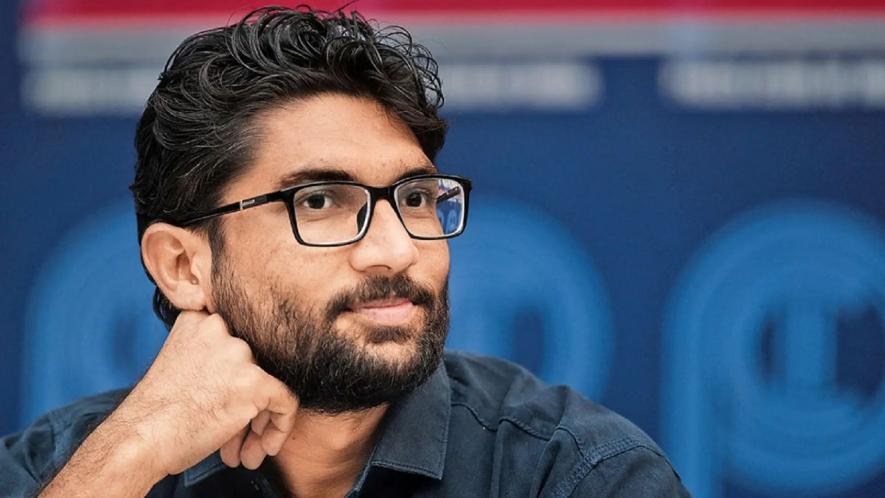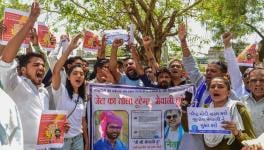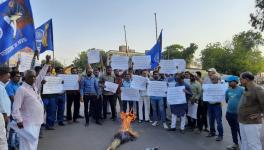Gujarat: Magistrate’s Court Acquits Jignesh Mevani, Others in Ahmedabad Rail Roko Case

Image Courtesy: Pune News
Introduction
On January 16, 2024 Ahmedabad Metropolitan Magistrate Court acquitted Congress MLA Jignesh Mevani and 29 others who were booked by Ahmedabad Railway Police for a rail roko protest in 2017 under IPC Section 143 (unlawful assembly), 147 (punishment for rioting), 149 (unlawful assembly in pursuit of common object), 332 (voluntarily causing hurt to deter public servant from his duty) and Section 153 of Indian Railway Act (endangering safety of persons travelling by railway by wilful act or omission).
According to the FIR filed by the Ahmedabad Railway Police on the day of the incident, i.e., January 11, 2017, Mevani and other protestors from Saroda village were accused of trespassing Kalupur Railway Station and delaying the departure of New Delhi bound Rajdhani Express for 20 minutes by jumping atop of the train engine and blocking the railway track, before being taken into custody by the police. One woman constable was also allegedly injured while arresting the protestors.
Additional Chief Metropolitan Magistrate P N Goswami noted in his judgement that there were several inconsistencies in the prosecution’s case, with the heavy reliance on police witnesses, accompanied by lack of valid material evidence against the accused. This led the court to give benefit of doubt to the accused, acquitting all, and referring one juvenile to the Juvenile Court for the separate trial.
Brief Background
The rail roko protest at Ahmedabad’s Kalupur Railway Station was organised by Jignesh Mevani, who is now an MLA from Vadgam constituency and convener at Rashtriya Dalit Adhikar Manch, along with other protestors for demanding from the state government the possession of land parcels which were allotted to Dalits but which remained in the possession of dominant upper caste, Indian Express reported. Mevani was elected as MLA in December 2017 for his first term in office.
A sessions court had in 2021 refused to discharge him in the case, as per a report in the Economic Times.
Mevani has been previously booked on similar charges by the state government on number of occasions for protesting against the government, and has since been acquitted in some of these cases, including the most recent acquittal in 2023, when he was booked for supporting sanitation workers of Ahmedabad Municipal Corporation (AMC) and charged for allegedly vandalising a police vehicle, and rioting. Incidentally, in 2022 the Assam Police came all the way to Gujarat to arrest Mevani in a case registered against him for criticising the Prime Minister Modi on the social media!
After the Una incident in 2016 where four Dalit youths were flogged by the cow vigilantes for skinning a dead cow, Mevani had organised a 370 km long street protest for demanding justice for the survivors of the Una violence and asked fellow Dalits to give up their traditional occupation of removing cow carcasses. Since 2015, he has been using public spaces and the street as an efficient mode of protest, and has organised various ‘rasta roko’ and ‘rail roko’ protests.
In the present case while the group was protesting against the state government’s policies and demanding attention of the government, initially the police seemed to have identified Mevani only on the basis of his popularity without conducting an identification parade in the presence of Executive Magistrate, leading to a suspicion over the motives of the police. Pertinently, thirteen out of 31 accused were women.
Case and the judgement analysis
The case against the accused as per the complaint mentions that the accused had “illegally entered platform no. 10 of the Kalupur Railway Station on January 11, 2017,” and “created fear” amongst the passengers of the train. The complaint records that the protestors laid down on the railway track, climbed on the railway engine and chanted slogans against the government. Furthermore, a women police constable, Sangita Devi, was also alleged to have been injured by the accused while removing them from the site. Pertinently, the accused were charged for criminal conspiracy and common intension to carry out the illegal act. Rejecting the claim of the prosecution about the conspiracy, the judgement notes that the “Prosecution has not tried to prove any facts as to where this conspiracy was hatched, who was its mastermind and what was the common intention of the accused. This does not prove a conspiracy. No facts have been brought on record as to what was the illegal intention of the accused in this deed.” (Para 5, Page No. 11, Criminal Case No. – 14899/2017, Metropolitan Magistrate Court, Ahmedabad)[1]
On the accusation that the protestors caused injury to policewoman Sangeeta Devi, the judge referred to her own statement, in which she did not blame the accused for the injury, and the evidence from the doctor that too did not support the claim of the police. The judgement records that the charges were not even proven by the police and the accused were falsely implicated in the case.
The verdict (in translation) reads, “The facts as to what offense was committed by the accused in this work have not been brought on record in the evidence of the Prosecution. The fact that the accused persons were falsely implicated in the commission of this crime should lead to the acquittal of the accused person”. Significantly, it was also observed that the charge under Section 149 of IPC was added just before the chargesheet was filed, after registering the offense, though the court recorded that the facts do not support the prosecution in proving the addition of the said Section.
The court, in its judgement, also pulled up the state for conducting flimsy investigation and providing poor evidence to support the case. The judge recorded that the number from which the (complaint) call came is not mentioned in the complaint by the police personnel nor does it state the name of the person from the control room who called the concerned police personnel to inform them about the incidents. The judgement also notes that the police did not register any complaint against the accused for being on the platform without possessing platform or railway ticket. Additionally, the identification parade was not conducted in the presence of witnesses of the accused by the Executive Magistrate and the accused were not found damaging any railway property or rail tracks.
The verdict found apparent contradictions in the evidence of the prosecution witness and pointed out that he could only identify Jignesh Mevani, but not the rest of the accused persons.
Interestingly, police statements based on the account of prosecution witness did not mention anything about what the crowd was demanding or chanting. The court further identified that most witnesses were from police department, and the police version heavily relied (almost exclusively) on these witnesses.
The judgement observed that “Regarding this incident, witness employees no photography or videography was taken from the R. P. F. employee’s mobile phone in relation to the incident. The names and addresses of the men and women who were on the track at the time of this incident were not verified and their statements were not recorded.” (Para 8, Sub-Para 48, Page No. 118)[2]
Given that no statements of fellow passengers travelling on Rajdhani train were recorded during the incident, the prosecution case was already weakened, but it also suffered from various other evidentiary deficiencies. The court observed that while “It is essential in complaint that the both the complainant and the accused in complaint must have the signature. On seeing the form 154 being shown to witness, it is stated that there is no signature of witness or of the accused as complainant.” (Para 8, Sub-Para 48, Page No. 118)[3]
Noting also the unreliability of the police witnesses, the verdict observes, “If we consider the facts of all the above oral and documentary evidence presented by the Prosecution in this case, it appears that among the witnesses who have presented evidence in this case, all the witnesses except the Police officers do not support the facts of this incident.” (Para 9, Page No. 128)[4]
While the video evidence in the form of a CD was submitted by the police which allegedly recorded the incident, the court rejected it as no certificate of the Indian Evidence Act under Section 65(B) was produced in respect of the CD. The court also found the police deliberately prolonging the case to harass the accused persons and observed, “it appears that the Investigating Officers have deliberately kept defects and defects in the investigation of this work with the intention that the court cannot make any order against the accused by considering the footage contained in this CD as proof against the accused.” (Para 12, Page No. 136)[5]
Commenting on the primary accusation that the accused delayed the train by 20 minutes, the court noted that the documentary evidence for this was not captured when it was available and an inquiry as to why these documents were not seized was never clarified by the officials. Thus, observing that there were “significant lapses and defects” in the investigation, the accused were given benefit of doubt and acquitted by the court.
Conclusion
The shrinking space for protests in civil society through muzzling of dissenting voices has now become a regular phenomenon in this country where the law itself been weaponised to target anyone having a divergent or dissenting viewpoint.
Selective and frequent cases against young opposition leaders who are effective in mobilising their communities has also seen a spike. Such political witch-hunting, especially of opposition voices, needs to be curbed by the enforcement of the rule of the law, and the present judgement does some measure of justice by recognising the misuse of punitive power and procedure and calling out the poor investigation against Jignesh Mevani and others.
The judgement may be read here:
Get the latest reports & analysis with people's perspective on Protests, movements & deep analytical videos, discussions of the current affairs in your Telegram app. Subscribe to NewsClick's Telegram channel & get Real-Time updates on stories, as they get published on our website.
























